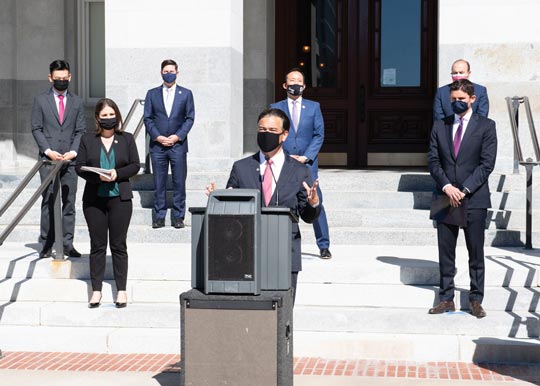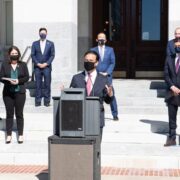
$1.4 million allocated to track anti-Asian incidents
CALIFORNIA legislators this week are seeking to address the recent surge of hate and violence against members of the Asian American and Pacific Islander (AAPI) community with proposals to increase funding and resources for victims.
Through Assembly Bill 85 — a fiscal measure to provide more resources as part of the state’s pandemic response — Assemblymember Phil Ting (D-San Francisco) secured $1.4 million to help track and collect data on anti-Asian hate incidents.
“The rise in hate incidents against Asian Americans during the pandemic is alarming. But, we can’t solve a problem without knowing how big it is,” Ting, chair of the Assembly Budget Committee, said in a statement on Monday, February 22.
The funding will support the efforts of Stop AAPI Hate, an online reporting site started by the Asian Pacific Policy and Planning Council, Chinese for Affirmative Action and San Francisco State University’s Asian American Studies department to gather incidents of xenophobia, racism and discrimination.
It will also go toward research into the COVID-19 related challenges directly impacting AAPI communities and the COVID-19 Multilingual Resources website, which was developed by faculty from the University of California, Los Angeles (UCLA)’s Asian American Studies Center and the UCLA Fielding School of Public Health, according to a release from the university.
“New state funding allows the data gathering to continue, and the research will ultimately lead us to solutions that will make all communities safer,” Ting added.
The bill was signed by Governor Gavin Newsom on Tuesday as part of the Golden State Stimulus package.
From March, when Stop AAPI Hate was started, to the end of 2020, the center received over 2,808 firsthand accounts of anti-Asian hate, ranging from shunning to physical attacks. During the same period, 126 accounts involved Asian Americans over the age of 60.
California accounted for the highest number of reports with 43% or more than 1,200 incidents.
However, community leaders and activists say that the number of incidents targeting AAPIs is underreported due to factors like language and cultural barriers that prevent victims from speaking up.
In the first two months of this year alone, several unprovoked attacks against AAPIs, particularly elderly individuals, have been documented in the Bay Area.
Vicha Ratanapakdee, an 84-year-old immigrant from Thailand, died of injuries after being shoved to the ground during his morning walk in the Anza Vista neighborhood of San Francisco on January 28. The 19-year-old suspect was arrested on suspicion of murder and elder abuse.
Another viral video shows an unidentified 91-year-old man pushed in Oakland’s Chinatown. The suspect, 28-year-old Yahya Muslim, was later arrested and accused of assaulting two other seniors that same day.
Incidents have also been recorded elsewhere, showing an alarming trend nationwide.
Noel Quintana, a 61-year-old Filipino man, was riding the New York subway on his way to work when he was slashed in the face by another passenger, requiring almost 100 stitches.
“Because of hate, our Asian American community has been yelled at, spat on, shoved down and beat up, punched in the face, slashed and disfigured, and murdered,” Assemblymember Rob Bonta (D-Alameda) said during a press conference at the south steps of the state Capitol on Monday.
Bonta, the state’s first Filipino American legislator, recounted how the recent attacks reminded him of when his mother was shoved to the ground and robbed while leaving work years ago.
“I haven’t thought about that in a while. The surge in hate crimes has reopened old wounds and created new ones,” he said. “Our community is in pain. We’re hurting. Many are scared and many like me are angry.”
Bonta blamed former President Donald Trump for using terms like “China virus” and “Kung flu” to describe the coronavirus, which has fueled the rise in incidents since the beginning of the pandemic.
The lawmaker was joined by representatives of the Asian, Latino, Black, Jewish and LGBTQ caucuses as they introduced several bills. Among the proposals include providing culturally sensitive support for victims, increasing training for law enforcement to document and collect data, and establishing a state government commission to monitor hate crimes.
Bonta’s bill, AB 886, seeks to fund community-based organizations that provide culturally competent mental health services for victims of hate violence and restorative justice programs, and to expand eligibility for victims of hate violence to access compensation funds even if they do not file a police report.
The measure also addresses prevention through “to proactively increase the likelihood that an individual who caused the harm would not do additional harm,” Bonta said.
Assemblymembers Al Muratsuchi (D-Torrance) and David Chiu (D-San Francisco) also introduced AB 557, a bill that would direct the state’s Department of Justice to establish a toll-free hotline and an online reporting system that would make it easier to report hate crimes and incidents.
Last week, House Democrats came together to denounce the attacks and pushed for more action from the Department of Justice to prevent future incidents.
President Joe Biden on January 26 signed an executive order to combat xenophobia and racism against AAPIs, which includes a directive for the Department of Justice to expand the collection of data and public reporting of hate incidents.
While the order was welcomed, many AAPI organizations and advocates said the administration can take bolder action to stop the incidents and address other pandemic-related issues the community is experiencing.






